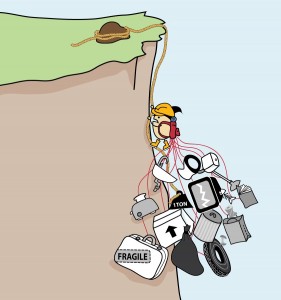Caregivers are at increased risk of depression and other health problems. Below are some suggestions about ways to keep well:
- Recognize and respond to signs of stress and depression
- Develop a healthy lifestyle
Recognize signs of stress or depression
If you notice that you have signs of stress or depression, take action and develop a plan to reduce them (e.g. delegate more of your duties and take time off). If you have symptoms of depression, contact your doctor for an assessment and to discuss treatment options.
Signs of stress
- Being more irritable, short-tempered, tense or anxious than usual
- Overeating or loss of appetite
- Difficulty falling asleep
- Minor aches and pains or feeling run down
- Using alcohol or other drugs to cope.
Signs of depression
Signs of depression include persistent flat or sad mood or loss of interest in things, and symptoms such as:
- A lack of energy and feeling very tired
- Being noticeably slowed down or very agitated and unable to settle
- Noticeable changes in appetite and weight
- Sleep problems (e.g. you sleep too much or can’t fall asleep)
- Feelings of worthlessness and excessive guilt
- Difficulty in concentrating, thinking or making decisions
- Recurrent thoughts about suicide or death.
People who are depressed may withdraw from social contact. They can find it much harder to function at work or to complete daily tasks. If these symptoms persist for at least two weeks you may have a depressive episode.
Develop a healthy lifestyle
 Rather than aim to lead the perfect lifestyle, see if you can include any of the following into your life:
Rather than aim to lead the perfect lifestyle, see if you can include any of the following into your life:
- A little regular exercise
- Eating healthy balanced meals
- A bit of regular time off to relax or pursue a hobby
- Time of to keep in contact with selective friends, family or a peer support group
- Regular sleep
- Treatment if you have a health condition.
It is vital to find ways of coping that are not destructive to your health. Examples of ways of coping that can be destructive in the long term include:
- Drinking too much alcohol, smoking or overeating to relieve stress
- Neglecting your own hygiene or health to save time when you are busy
- Isolating yourself from everyone to attend to chores or because they may not understand your situation.

